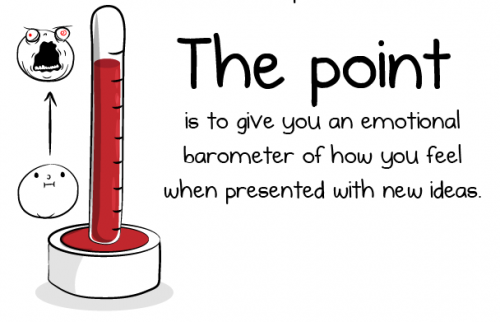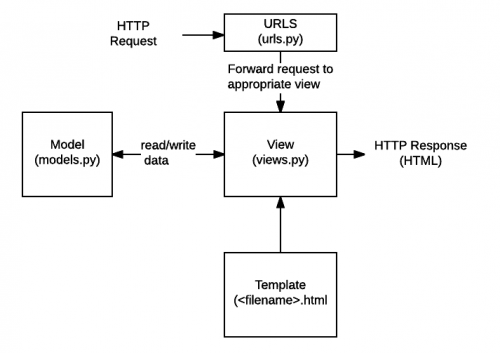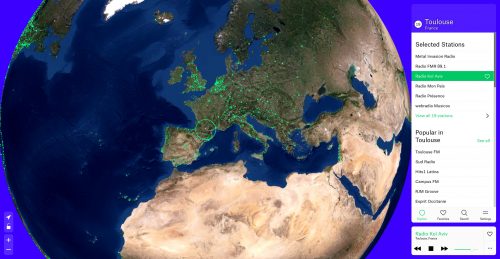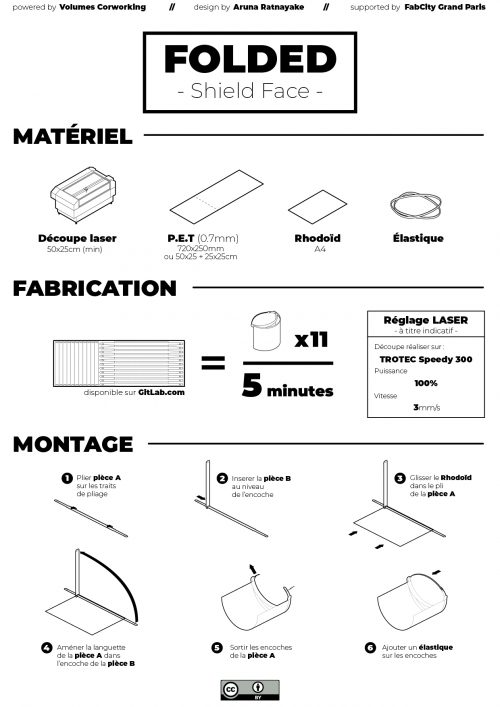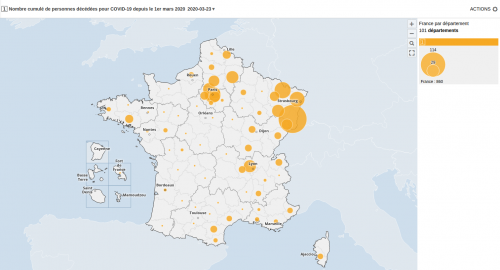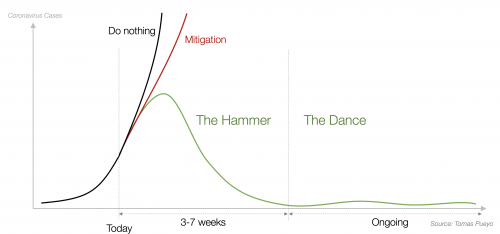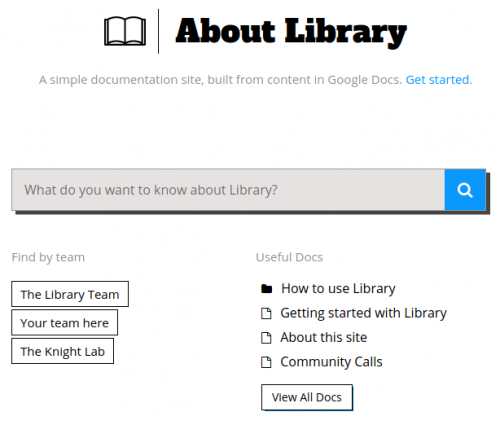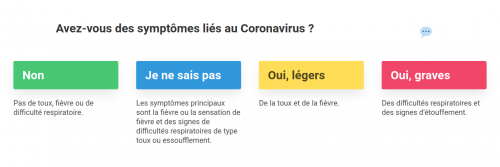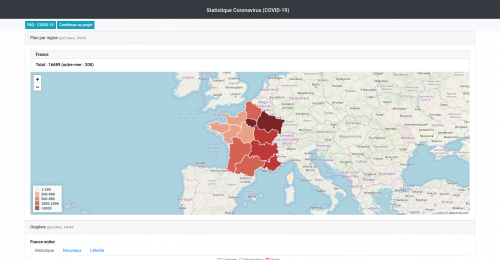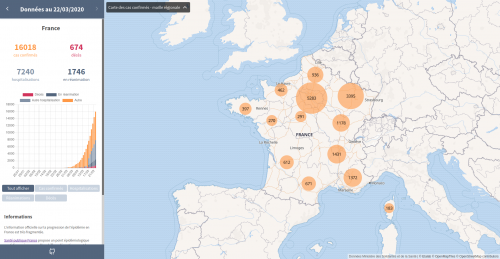Ce qui rend la situation actuelle tellement dangereuse, ce n’est pas seulement les morts qui s’accumulent chaque jour davantage, c’est la suspension générale d’un système économique qui donne donc à ceux qui veulent aller beaucoup plus loin dans la fuite hors du monde planétaire, une occasion merveilleuse de « tout remettre en cause ». Il ne faut pas oublier que ce qui rend les globalisateurs tellement dangereux, c’est qu’ils savent forcément qu’ils ont perdu, que le déni de la mutation climatique ne peut pas durer indéfiniment, qu’il n’y a plus aucune chance de réconcilier leur « développement » avec les diverses enveloppes de la planète dans laquelle il faudra bien finir par insérer l’économie. C’est ce qui les rend prêts à tout tenter pour extraire une dernière fois les conditions qui vont leur permettre de durer un peu plus longtemps et de se mettre à l’abri eux et leurs enfants. « L’arrêt de monde », ce coup de frein, cette pause imprévue, leur donne une occasion de fuir plus vite et plus loin qu’ils ne l’auraient jamais imaginé[2]. Les révolutionnaires, pour le moment, ce sont eux.
C’est là que nous devons agir. Si l’occasion s’ouvre à eux, elle s’ouvre à nous aussi. Si tout est arrêté, tout peut être remis en cause, infléchi, sélectionné, trié, interrompu pour de bon ou au contraire accéléré. L’inventaire annuel, c’est maintenant qu’il faut le faire. A la demande de bon sens : « Relançons le plus rapidement possible la production », il faut répondre par un cri : « Surtout pas ! ». La dernière des choses à faire serait de reprendre à l’identique tout ce que nous faisions avant.
…nous commençons à l’imaginer par nos petits gestes insignifiants mis, eux aussi, bout à bout : à savoir la suspension du système de production. En nous posant ce genre de questions, chacun d’entre nous se met à imaginer des gestes barrières mais pas seulement contre le virus : contre chaque élément d’un mode de production dont nous ne souhaitons pas la reprise.
D’où l’importance capitale d’utiliser ce temps de confinement imposé pour décrire, d’abord chacun pour soi, puis en groupe, ce à quoi nous sommes attachés ; ce dont nous sommes prêts à nous libérer ; les chaînes que nous sommes prêts à reconstituer et celles que, par notre comportement, nous sommes décidés à interrompre.
Si en un mois ou deux, des milliards d’humains sont capables, sur un coup de sifflet, d’apprendre la nouvelle « distance sociale », de s’éloigner pour être plus solidaires, de rester chez soi pour ne pas encombrer les hôpitaux, on imagine assez bien la puissance de transformation de ces nouveaux gestes-barrières dressés contre la reprise à l’identique, ou pire, contre un nouveau coup de butoir de ceux qui veulent échapper pour de bon à l’attraction terrestre.
Il s’agit de faire la liste des activités dont vous vous sentez privés par la crise actuelle et qui vous donnent la sensation d’une atteinte à vos conditions essentielles de subsistance. Pour chaque activité, pouvez-vous indiquer si vous aimeriez que celles-ci reprennent à l’identique (comme avant), mieux, ou qu’elles ne reprennent pas du tout. Répondez aux questions suivantes :
Question 1 : Quelles sont les activités maintenant suspendues dont vous souhaiteriez qu’elles ne reprennent pas ?
Question 2 : Décrivez a) pourquoi cette activité vous apparaît nuisible/ superflue/ dangereuse/ incohérente ; b) en quoi sa disparition/ mise en veilleuse/ substitution rendrait d’autres activités que vous favorisez plus facile/ plus cohérente ? (Faire un paragraphe distinct pour chacune des réponses listées à la question 1.)
Question 3 : Quelles mesures préconisez-vous pour que les ouvriers/ employés/ agents/ entrepreneurs qui ne pourront plus continuer dans les activités que vous supprimez se voient faciliter la transition vers d’autres activités ?
Question 4 : Quelles sont les activités maintenant suspendues dont vous souhaiteriez qu’elles se développent/ reprennent ou celles qui devraient être inventées en remplacement ?
Question 5 : Décrivez a) pourquoi cette activité vous apparaît positive ; b) comment elle rend plus faciles/ harmonieuses/ cohérentes d’autres activités que vous favorisez ; et c) permettent de lutter contre celles que vous jugez défavorables ? (Faire un paragraphe distinct pour chacune des réponses listées à la question 4.)
Question 6 : Quelles mesures préconisez-vous pour aider les ouvriers/ employés/ agents/ entrepreneurs à acquérir les capacités/ moyens/ revenus/ instruments permettant la reprise/ le développement/ la création de cette activité ?
(Trouvez ensuite un moyen pour comparer votre description avec celles d’autres participants. La compilation puis la superposition des réponses devraient dessiner peu à peu un paysage composé de lignes de conflits, d’alliances, de controverses et d’oppositions.)

